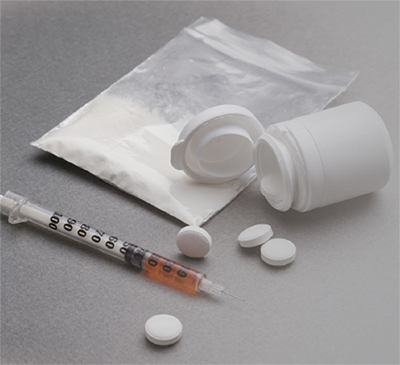
Even a few years ago, drugs seemed to be a problem only for foreign countries. People thought of drugs only as an incomprehensible culture of foreign, especially the western countries. When it comes to drugs, Korea had a pride as a drug-free country and the word “drug” was rarely found in everyday life. In fact, looking at the big data, we can see that there were only about 62,000 online drug references in a year a decade ago. However, things are totally different nowadays. Recently, for a year, drug references have reached about 2.88 million. The figure is more than a 46 times increase from a decade ago! Why did this happen? The frequent occurrence and report of domestic drug cases must be one of the main reasons.
This year alone, people have seen many drug cases in Korea. Last September, Lee Sun-ho, the eldest son of CJ group chairman, which is a major conglomerate in Korea, was caught trying to smuggle a mutated drug, liquid cannabis cartridge into South Korea after purchasing them from abroad. He was also accused of taking drugs. Lee’s urine test, conducted by the prosecution, tested positive for marijuana.
Unlike the other drug cases of chaebol blood relatives, since he is the eldest son who is directly involved in the company’s management, people’s distrust of the chaebol has grown greater. Meanwhile, last June, according to a report by an informant, B.I., a member of a well-known K-pop group affiliated with YG Entertainment, iKON, purchased marijuana and smoked it in 2016. The informant also said when he was arrested on marijuana smoking charges in 2016, he already stated that he had delivered the drugs to B.I. In this process, the informant said that there was pressure from Yang Hyun-seok, the former chief producer of YG Entertainment, to reverse his statement about B.I. This statement worsened the controversy even further and B.I announced his withdrawal from his team six hours after the report of his alleged drug use.
Moreover, earlier this year, Seung-ri, a member of Big Bang affiliated with the same agency, was also embroiled in a drug-related controversy. This is because there was circumstantial evidence that drugs were circulating and sex crimes were being committed using drugs at his club, Burning Sun. Furthermore, Burning Sun’s staffs, including the Chinese, were also tested positive for drugs, thus public opinion intensified that Seung-ri condoned drugs circulating in his club even though he knew them.
As such, we are seeing a lot of drug-use cases these days. Therefore, The UOS Times felt the seriousness of this problem and are going to look into the punishment for drug crimes, what drugs are, why they are banned, and let people know the dangers of drugs.
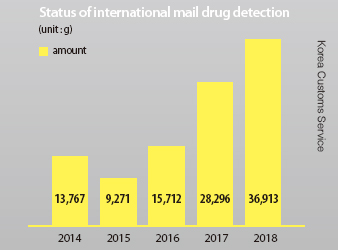

Drug crimes are violent crimes in Korea. This is because drugs are not only harmful in themselves, but can also destroy people’s health, cloud their judgment, and cause other secondary crimes. However, many people still do not realize the seriousness of punishment on drugs. People can be punished even if they simply possess drugs or carry them without knowing they are drugs. According to the Act on the Management of Drugs, those who import, export, manufacture, sell, or possess drugs in violation of the prohibition, shall be sentenced to life imprisonment or imprisonment for more than five years. Furthermore, those who commit such crimes for profit or habitually shall be sentenced to death, life imprisonment, or imprisonment for more than 10 years.
Also, any person who attempted or conspired to commit the aforementioned crimes shall be subject to punishment. Additionally, those who provide places, facilities, equipment, funds or means of transportation to others for prohibited acts related to drugs can also be sentenced to prison or fined. In case of drug crimes, not only the punishment but also the confiscation of drugs, facilities, equipment, funds, means of transport provided for the crime, and profits from such crimes is also carried out. As we can know from the Act, in drug crimes, even if someone was very slightly related to the crime, he or she can be punished. Also, even if Koreans smoke marijuana in a country that does not regulate marijuana, they will be punished under the Korean law if caught.
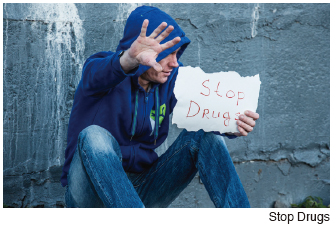
However, despite the strong punishment, drug crimes are highly increasing in Korea. According to the Korea Customs Service, in 2018, 407 cases of drugs, sneaking into the country via international mail, were caught, and they were about 1.59 billion KRW in market value. The total weight reached 36,913 grams, the highest level in nearly five years, just like the number of cases detected.
Also, the number of drug smuggling via flight more than doubled to 58 in 2018, compared with 27 in 2014. The scale of contraband drugs has also increased 5.7 times in a year from 15,325 grams in 2017 to 87,223 grams in 2018. Especially for cocaine, the scale has increased 109 times in a year from 75 grams in 2017 to 8,155 grams in 2018. Moreover, the amount of methamphetamine manufactured in South Korea has also been increasing recently. According to the Supreme Prosecutors’ Office, the number of domestic manufactured methamphetamine, caught and confiscated by investigative agencies, rose from 200 grams in 2016 to 513 grams in 2017, and 660 grams last year.
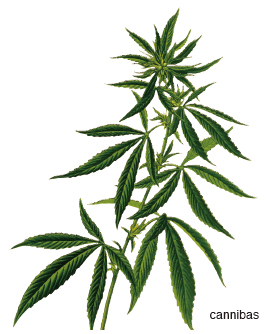
Why is there a sudden inflow of drugs and increase in drug use? One of the main reasons is the development of the Internet and social media. Through them, purchasing drugs has become a lot easier. Besides, drug-making methods are also actively shared through the Dark Web which is hard to trace. The entrance of a Chinese drug organization into the drug black market in Korea is also the reason for the explosive increase of drug smuggling.
This increase in drugs makes it easier to get access to drugs. As we can see from above, punishment of doing drugs and even possessing them is so strong. Therefore, it is necessary to know exactly what drugs are. However, the definition of drugs varies from country to country. In Korea, cannabis to heroin are all defined as drugs, some of which are considered less taboo compared to other well-known drugs. Let’s find out the two major drugs that Korean celebrities illegally took or possessed, and why they should be prohibited.
First, in Korea, various kinds of narcotics are defined as cannabis, psychotropic drugs, and drugs. Psychotropic drugs, though used for medical purposes, are very dangerous if abused. The most common drugs we hear on the news is marijuana. Marijuana refers to cannabis, its resin.
Most countries regulate the production, possession, use and sale of marijuana by law, citing its hallucinations and addiction caused by mental dependence. It is obvious that addiction to marijuana and hallucinations are not that powerful compared to other toxic drugs such as methamphetamine called philopon. Therefore, because of the toxicity and dependence level that is not stronger than expected, some Korean celebrities and average people seem to lower their guard against marijuana not only in Korea but also abroad. However, if you start to get addicted to marijuana, your visual and auditory hallucination can get worse than being addicted to alcohol and tobacco.
Next, the most popular drug that celebrities got busted for in Korea is philopon. Philopon is a psychotropic drug. In Korea, philopon is often referred to as bbong and the expression “intoxicated to bbong” is probably derived from this drug. Even a small amount of 10mg increases the efficiency of work as it eliminates fatigue, makes the mind and body feel refreshed, but if you fall into a habit of taking them, it causes chronic poisoning such as blood vessel shrinkage, rise in blood pressure, hallucination, and schizophrenia. For this, the extreme doses are 50 milligrams per day, and when injected in large quantities, it is extremely difficult not to become addicted. In about a month or so, symptoms of addiction can be eliminated but mental symptoms remain for a long time.
Other drugs include heroin and cocaine. These two drugs are also strongly banned in most countries, and they are even hard to get illegally in our country. It’s a terrible drug, because it brings extreme withdrawal symptoms. Cocaine is an anesthetic medicine and is often used in ophthalmology. When cocaine is overused and you become addicted, dryness and loss of strength is notable. Psychosomatic hallucinations of cocaine are shown in addition to concentration difficulties and the devastation of moral senses. In extreme cases, the addicted person would feel like a hump or a small animal is crawling over the body, so eventually they tear themselves apart and end up with many scars.
As such, if you are addicted to drugs, the symptoms become serious, and the side effects will continue to be serious even after you quit taking drugs. However, by frequently watching the news that celebrities take drugs, Koreans keep getting interested in drugs. This is something that we should worry about. If the media keeps showing off their drug cases of well-known people, people can’t help but wonder how it feels to take drugs and why they keep doing it. Additionally, drugs make it even harder for the people around the addict, because they have to watch their addicted friends or family break down. Even if legal punishment is strong, the law cannot prevent “addiction.” Therefore, when describing the seriousness and side effects of drugs, it can be helpful in preventing drugs by emphasizing the negative factors as much as possible. Also, we should refrain from using the words like “pleasure” or “feeling good” when we emphasize the negative factors.
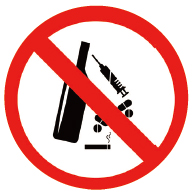
In some respects, some may say that strong regulations of drugs are an excessive violation of individual freedom. However, you should know that regulating drugs is not a violation of your freedom, but a preventive measure to lead you to live a healthier, happier life. Therefore, it is necessary to be wary of drugs even for an individual’s healthy life. Although we now live in a more accessible environment to drugs than before, The UOS Times hope that people will always consider its dangers and the fear of punishment, and keep a healthy and beautiful life.
Kim Jin-woo
kjw1004i@uos.ac.kr
Choi Hyun-jung
guswjd5891@uos.ac.kr

